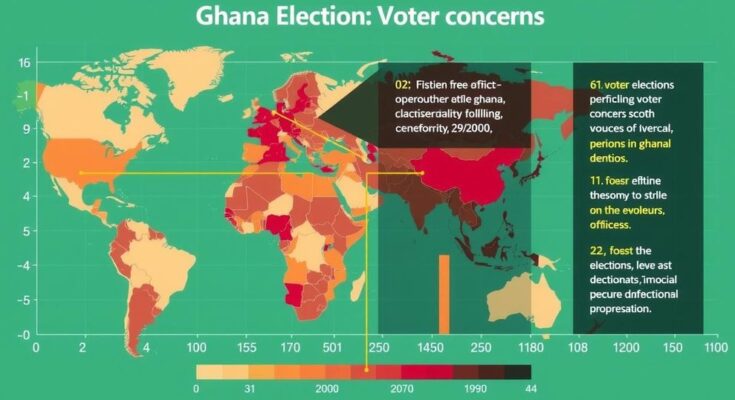Ghana prepares for its ninth general election, with the NPP aiming for a third consecutive term amid economic challenges. Rising inflation peaked at 54.1%, significantly impacting living standards, especially for youth with high unemployment rates. Concerns over resource management and economic performance dominate voter sentiments as the electorate heads to the polls on December 7, 2024.
Ghana is gearing up for its ninth general election since the re-establishment of multiparty democracy in 1992, witnessing a competitive political landscape primarily dominated by the National Democratic Congress (NDC) and the New Patriotic Party (NPP), who have each held the presidency for a total of 16 years. This election bears particular significance as the NPP seeks an unprecedented third consecutive term in office. The electorate’s concerns reflect broader economic challenges, particularly the high inflation rates that surged in early 2022, peaking at 54.1% in December 2022. Although the overall inflation rate has stabilized, prices of essential goods remain elevated, with staple foods such as eggs and tomatoes doubling in price over the past year, contributing to heightened poverty levels and deteriorating living standards, as noted by the World Bank.
The backdrop of economic turmoil includes Ghana’s default on debt payments in 2022, which has necessitated extended negotiations with international lenders for loan restructuring and financial support from the International Monetary Fund. President Nana Akufo-Addo has acknowledged the economic “crisis” yet attributes the predicament to external factors, countered by criticism from the opposition and economists who attribute it to governmental economic mismanagement. Ghana’s debt burden has escalated significantly, with over 70% of government income devoted to servicing debts by 2022.
Youth unemployment has seen a troubling rise, with the unemployment rate now affecting one in seven Ghanaians, while for individuals aged 15 to 24, the unemployment rate stands at nearly 30%. Given that over half of the populace is under 35 years old, the perspectives of younger voters hold substantial weight in determining electoral outcomes.
The role of gold mining in Ghana’s economy has also become a focal point of discussion, particularly regarding the environmental consequences of small-scale illegal mining. As the largest producer of gold in Africa, and the tenth worldwide, Ghana’s mining sector remains a crucial driver of foreign exchange, with gold exports exceeding $5.2 billion in 2023. Aside from gold, Ghana boasts rich reserves of oil, gas, and cocoa, significantly contributing to national wealth, although recent economic trends indicate stagnation in the average annual income since 2017.
Historically, Ghana has been recognized as a stable democracy, avoiding the political instability prevalent in much of the region, and elections are generally characterized by close results and peaceful transitions of power. With the election scheduled for December 7, results are anticipated within three days. As the electorate prepares to cast their votes, the pressing economic issues and the insights from younger citizens will be pivotal in the decision-making process.
Ghana’s political system transitioned to multiparty democracy in 1992, leading to consistent electoral participation and notable changes in leadership. The NDC and NPP have been the two significant political parties, each achieving equal terms in governance. The current election cycle is marked by significant economic challenges, including unprecedented inflation rates and rising unemployment, particularly among youth. Factors such as public dissatisfaction with economic management and the impact of natural resources on the economy are crucial elements shaping the political landscape as voters approach the polls.
In summary, Ghana’s upcoming general election reflects deep-seated concerns surrounding economic stability, youth unemployment, and the management of natural resources. With inflation impacting the everyday lives of Ghanaians and significant segments of the population particularly affected, the electorate’s response will likely hinge on the perceived efficacy of incumbent leadership versus the alternatives presented by opposition parties. As the NPP aspires for continued governance, the strategies addressing these critical issues will be central to electoral success or failure. The election outcome will not only determine the future political landscape but will also signal the electorate’s response to ongoing economic challenges.
Original Source: www.bbc.co.uk




